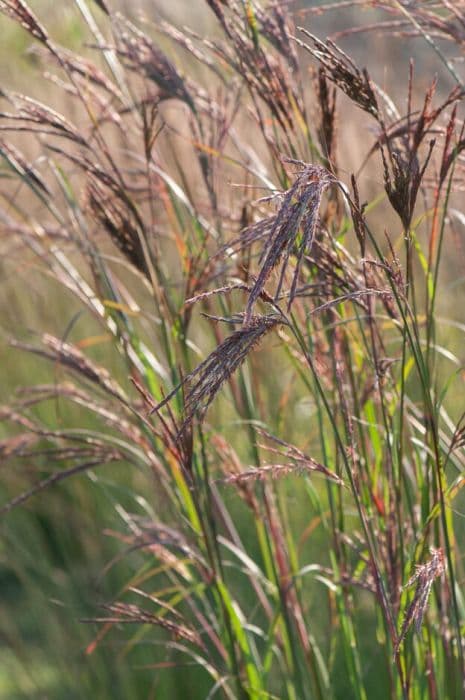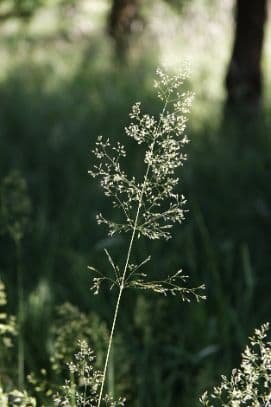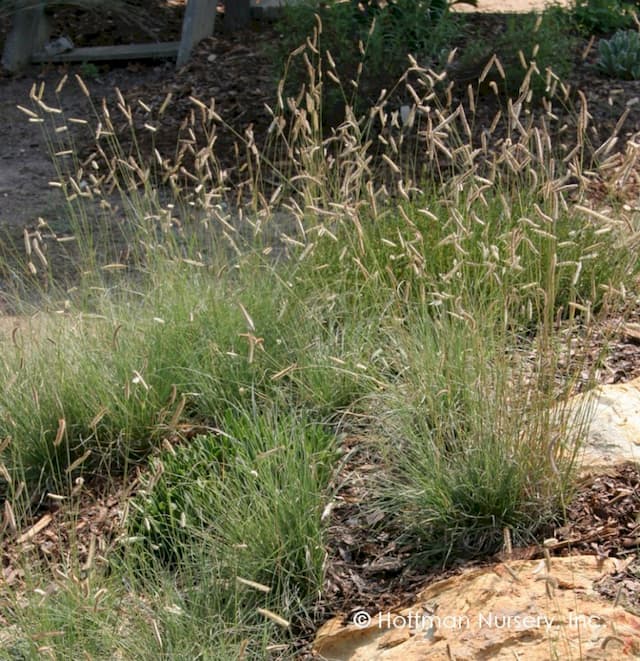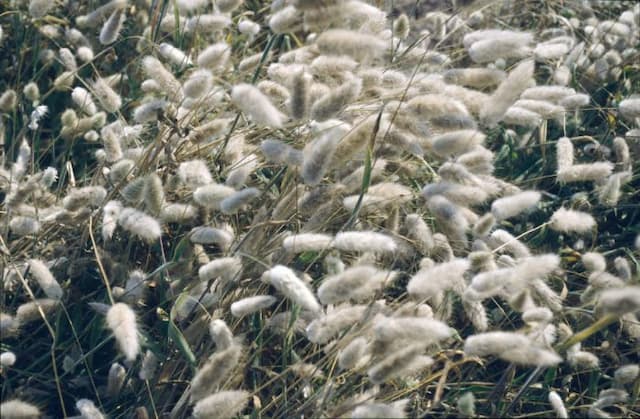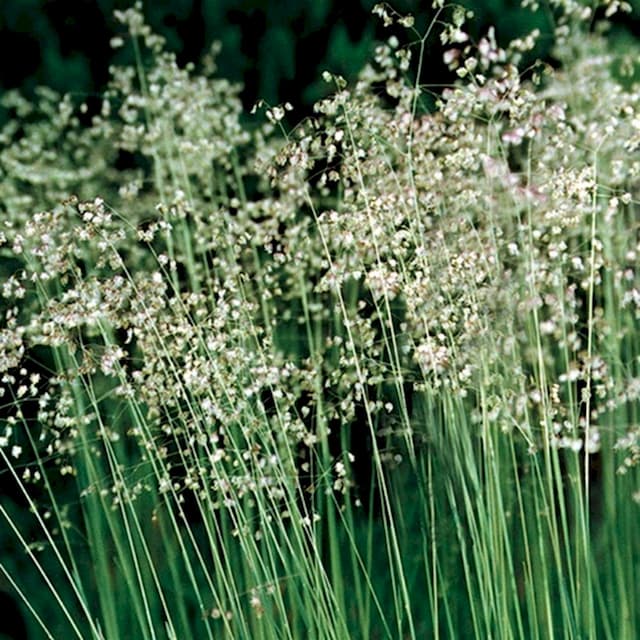Maiden Grass Miscanthus sinensis 'Goliath'











ABOUT
Miscanthus sinensis 'Goliath', commonly known as Chinese silver grass or eulalia, is a robust, perennial grass known for its striking appearance. This cultivar typically forms a clump of arching foliage, with long, narrow leaves that have a graceful, upright-to-arching habit. The leaves are a bright green color, often exhibiting a silvery midrib that runs down the center of each blade. As the seasons change, the foliage can take on warm shades of yellow, orange, or even purple, adding seasonal interest to the garden. The plant produces feathery flower plumes, which emerge above the foliage in late summer or early autumn. These plumes start with a reddish or pinkish hue and gradually fade to a soft, silvery white as they mature and go to seed. The flowers can add a fuzzy, almost ethereal quality as they catch the light and move gently with the breeze. These blooms are favored in floral arrangements both fresh and dried. Overall, Chinese silver grass 'Goliath' is admired for its graceful form and ability to add texture, movement, and a touch of elegance to a landscape. It is considered to be a low-maintenance plant, adding long-lasting visual interest to gardens and outdoor spaces.
About this plant
 Names
NamesFamily
Poaceae
Synonyms
Chinese Silver Grass, Maiden Grass, Eulalia, Japanese Silver Grass, Porcupine Grass, Zebra Grass
Common names
Miscanthus sinensis 'Goliath'
 Toxicity
ToxicityTo humans
Maiden grass, including the variety Miscanthus sinensis 'Goliath', is not known to be toxic to humans. There is no widespread evidence or reports of poisoning or toxic symptoms in humans resulting from ingesting or handling parts of this plant. As with any plant material, individual sensitivities can vary, and it's always prudent to avoid ingesting plants not meant for consumption.
To pets
Maiden grass, including the Miscanthus sinensis 'Goliath' variety, is not considered to be toxic to pets. There have been no significant reports of toxicity or poisoning in pets such as dogs and cats from ingesting this plant. However, ingestion of any plant material can sometimes cause digestive upset in pets, such as vomiting or diarrhea, so it is usually advised to keep an eye on your pet and prevent them from eating plants not intended for consumption.
 Characteristics
CharacteristicsLife cycle
Perennials
Foliage type
Deciduous
Color of leaves
Green
Flower color
Silver
Height
8-10 feet (2.4-3.0 meters)
Spread
3-5 feet (0.9-1.5 meters)
Plant type
Grass
Hardiness zones
5
Native area
Asia
Benefits
 General Benefits
General Benefits- Ornamental value: Adds visual interest to gardens with its tall stature and feathery plumes.
- Privacy screen: Ideal for creating natural privacy screens due to its dense growth habit.
- Erosion control: Helps prevent soil erosion with its extensive root system.
- Low maintenance: Requires minimal care once established, making it a hassle-free choice for gardeners.
- Drought tolerance: Can survive with limited water, making it suitable for xeriscaping.
- Pest resistant: Generally resistant to pests, reducing the need for chemical treatments.
- Seasonal interest: Offers year-round interest with changing foliage colors and persistent flower heads.
- Wildlife habitat: Provides shelter and food for birds and other wildlife.
- Adaptability: Thrives in a wide range of soil types and conditions.
- Bioenergy crop: Potential use as a biofuel source due to its high biomass production.
 Medical Properties
Medical PropertiesThis plant is not used for medical purposes.
 Air-purifying Qualities
Air-purifying QualitiesThis plant is not specifically known for air purifying qualities.
 Other Uses
Other Uses- As a biodegradable pot for nursery plants: The fibrous roots and base of mature Miscanthus sinensis 'Goliath' can be fashioned into containers for growing nursery plants, which later decompose in the soil.
- As an acoustic barrier: Tall and dense stands of Miscanthus sinensis 'Goliath' are effective in reducing noise pollution when planted along highways or around industrial areas.
- For artistic crafting: The dried canes of Miscanthus sinensis 'Goliath' are used in basketry and weaving, providing a natural and rustic material for artisans.
- As a natural mulch: Chopped leaves and thin stems of Miscanthus sinensis 'Goliath' can be spread over garden beds to suppress weeds and conserve soil moisture.
- In wildlife gardens: The dense growth of Miscanthus sinensis 'Goliath' provides excellent cover and nesting opportunities for birds and small mammals.
- As a privacy screen: Because of its height and density, Miscanthus sinensis 'Goliath' can be used to create a fast-growing privacy screen in residential gardens.
- In erosion control: The robust root system of Miscanthus sinensis 'Goliath' helps stabilize soil on slopes, preventing erosion from wind and water.
- For vegetative roofs: The lightweight and drought-resistant characteristics of Miscanthus sinensis 'Goliath' make it a suitable plant for green roofing projects.
- As a biofuel source: The high biomass yield of Miscanthus sinensis 'Goliath' makes it a potential feedstock for renewable energy production, such as bioethanol.
- For paper production: The fibrous stems of Miscanthus sinensis 'Goliath' can be used as raw material in paper manufacturing, offering an alternative to traditional wood pulp.
Interesting Facts
 Feng Shui
Feng ShuiThe Maidenhair Grass is not used in Feng Shui practice.
 Zodiac Sign Compitability
Zodiac Sign CompitabilityThe Maidenhair Grass is not used in astrology practice.
 Plant Symbolism
Plant Symbolism- Resilience: Miscanthus sinensis 'Goliath', commonly known as Chinese silver grass, often symbolizes resilience due to its ability to thrive in various conditions and withstand strong winds and weather changes.
- Adaptability: Chinese silver grass represents adaptability, as it is a versatile plant that can grow in a range of environments, from full sun to partial shade.
- Growth: The rapid and large growth of Chinese silver grass can be symbolic of personal or spiritual growth, owing to its towering presence in the landscape.
- Privacy: Often used in landscaping to create private spaces, Chinese silver grass signifies the importance of having a personal retreat or sanctuary.
- Elegance: The feathery plumes and graceful form of Chinese silver grass convey a sense of elegance and refined beauty.
 Water
WaterThe Maiden Grass (or Eulalia) prefers even moisture but can tolerate some drought once established. It should be watered deeply, with about 1 inch of water per week. During the growing season, especially in the absence of rainfall, the plant may need watering twice per week to maintain consistent soil moisture. Overwintering plants require less water, tapering off to only occasional watering to prevent the soil from drying out completely. Avoid overhead watering to minimize the risk of fungal diseases.
 Light
LightMaiden Grass thrives in full sunlight, requiring at least 6 hours of direct sunlight daily. The ideal spot would be an open area away from buildings or shade-casting trees. Partial shade is tolerable, but too much shade can lead to reduced foliage density and poor flowering.
 Temperature
TemperatureMaiden Grass is hardy and can withstand a wide range of temperatures, typically growing well in USDA zones 4-9. It can survive temperatures as low as -30°F and as high as 90°F, but it grows best in temperatures between 70°F and 85°F.
 Pruning
PruningMaiden Grass should be pruned to improve its appearance and health. The best time for pruning is late winter or early spring before new growth begins, cutting back to about 4-6 inches above ground level. Pruning helps stimulate new growth, removes any dead or damaged foliage, and maintains a neat form.
 Cleaning
CleaningAs needed
 Soil
SoilFor Miscanthus sinensis 'Goliath', or Giant Silver Grass, a well-drained, fertile loamy soil is best, enriched with organic matter. A pH range of 5.5 to 7.0 is optimal for this ornamental grass.
 Repotting
RepottingGiant Silver Grass is typically planted outdoors rather than in containers, so repotting is not a common practice. However, if necessary, you can divide the plants in the spring every 2-3 years to manage their size.
 Humidity & Misting
Humidity & MistingGiant Silver Grass is adaptable to a wide range of humidity levels and does not have specific humidity requirements. It thrives in outdoor environments where it can adapt to the local humidity.
 Suitable locations
Suitable locationsIndoor
Place Giant Silver Grass near bright window; water sparingly.
Outdoor
Plant in full sun, well-draining soil, space 3 feet apart.
Hardiness zone
4-9 USDA
 Life cycle
Life cycleMiscanthus sinensis 'Goliath', commonly known as Giant Miscanthus, begins its life cycle as a clump of rhizomes that sprouts new shoots in early spring. The fast-growing shoots develop into tall, robust grasses with wide, green leaves and can reach up to 3 meters in height. By late summer, it produces feathery flower plumes that can add another 1 to 2 meters to the plant's height and turn a silvery tan as they mature. In the fall, the foliage changes color to a dry brown, while the plant remains structurally sound and provides winter interest in the landscape. With the onset of winter, the above-ground part of the plant dies back, but the rhizomes survive underground and enter a period of dormancy. The cycle restarts in the next spring when temperatures warm up, initiating new growth from the rhizomes.
 Propogation
PropogationPropogation time
Spring-Early Summer
Miscanthus sinensis 'Goliath', commonly known as Giant Silver Grass, is typically propagated through division, which is the most popular method for this ornamental grass. Propagation by division is best done in late winter to early spring, just before the new growth starts. To propagate by division, the gardener should carefully dig up the parent plant and separate the clump into smaller sections, ensuring that each section has a few healthy shoots and a portion of the root system. The divisions should then be replanted immediately, spaced about 3 to 4 feet (about 1 to 1.2 meters) apart to accommodate the mature size of the plant. Water the new divisions well to help establish them. This method of propagation allows for rapid multiplication of the plants and maintains the characteristics of the parent plant, making it ideal for gardeners looking to expand their planting of Giant Silver Grass.
